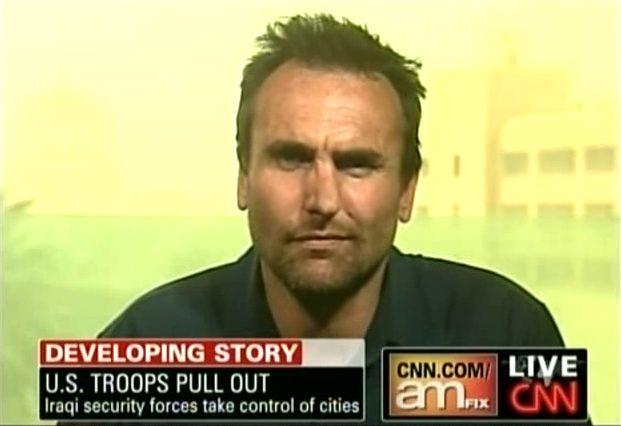AAM: "The men and women of the Armed Forces aren't coming home anytime really soon."
June 30, 2009

Length: 3:09
LARGE (36.6 MB) ----- SMALL (3.9 MB)
A second American Morning appearance, and a discussion of the dangers faced by Iraqi troops to keep a lid on the violence.
KIRAN CHETRY: U.S. forces have officially turned over control of cities and towns in Iraq to the country's security forces. Iraq declared this a public holiday calling it National Sovereignty Day.
Some celebrated during overnight hours with fireworks and some singing and dancing in central Baghdad. There wasn't a mass exodus today, though. U.S. troops have been slowly pulling out. Most were gone by this past weekend.
Our Michael Ware is tracking things live in Baghdad this morning. And the other thing, you know, to say that, you know, there's been this mass pullout, I mean, we still have more than 100,000 troops in Iraq.
MICHAEL WARE, CNN INTERNATIONAL CORRESPONDENT: Oh, yes, let's not delude ourselves. We're not seeing a mass exodus of American troops. I mean, unfortunately, the men and women of the Armed Forces aren't coming home anytime really soon.
Under the agreement that was signed by the Bush administration that started this war and effectively established the end of this war, the U.S. has another 18 months to get the troops out. After that date, not one single combat boot is to remain.
Under the plan as it stands by the Obama administration, ideally that should be completed by August of next year. I think we're going to have to wait and see how that goes.
Those combat troops have retreated to a pre-designated bases, a planned phased withdrawal that began back in January. It took a long time. It's all done now.
They underwrite the security just by their presence. And, of course, they're going to have to continue providing air support and firepower to the Iraqis. Because on their own, this really wouldn't be an entirely fair fight against the militant extremists, particularly Al Qaeda, and particularly the extremely well-trained Shia militants backed by Iran -- Kiran.
CHETRY: Yes. There's also some brand new CNN/Opinion Research poll out this morning. It shows that about half of people think that violence will increase in Iraq when we see U.S. troops leave. However, that same study shows or poll, rather, shows that people don't necessarily want us to go back into those urban areas because of that uptick in violence. So is that concern also there in Iraq about what's going to happen once we're gone?
WARE: Oh, absolutely. Absolutely. And in many ways people feel that the U.S. has gone, certainly in terms of the street and certainly in terms of the environment and what you can taste when you're in the neighborhood because the U.S. forces simply aren't there. And the people are celebrating that. Because whether it was well intended or not, it was a foreign occupation and they're delirious that that is finished.
But the Iraqi people are well aware of the capabilities and the limitations of their own security forces. But given it's been a river of Iraqi blood that's been spilt over these last seven years, no one more than the Iraqis know the risks that they're taking, nor does anyone know better than them the price that they most likely will have to pay for this sovereignty -- Kiran.
CHETRY: Michael Ware for us in Baghdad this morning. Thanks.
